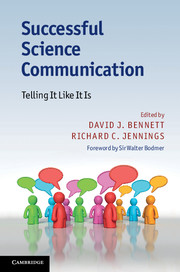Book contents
- Frontmatter
- Contents
- Foreword
- Authors' biographies
- Introduction Public engagement in an evolving science policy landscape
- Part I What it helps to know beforehand
- 1 Deficits and dialogues: science communication and the public understanding of science in the UK
- 2 Explaining the world: communicating science through the ages
- 3 Science: truth and ethics
- 4 The public's view of science
- 5 The common language of research
- 6 Not 100% sure? The ‘public’ understanding of risk
- 7 The ethos of science vs. ethics of science communication: on deficit and surplus models of science–society interaction
- Part II Policy-makers, the media and public interest organisations
- Part III What you can do and how to do it
- Part IV And finally, evaluating and embedding science communication
- Index
- Plate section
- References
1 - Deficits and dialogues: science communication and the public understanding of science in the UK
Published online by Cambridge University Press: 05 May 2013
- Frontmatter
- Contents
- Foreword
- Authors' biographies
- Introduction Public engagement in an evolving science policy landscape
- Part I What it helps to know beforehand
- 1 Deficits and dialogues: science communication and the public understanding of science in the UK
- 2 Explaining the world: communicating science through the ages
- 3 Science: truth and ethics
- 4 The public's view of science
- 5 The common language of research
- 6 Not 100% sure? The ‘public’ understanding of risk
- 7 The ethos of science vs. ethics of science communication: on deficit and surplus models of science–society interaction
- Part II Policy-makers, the media and public interest organisations
- Part III What you can do and how to do it
- Part IV And finally, evaluating and embedding science communication
- Index
- Plate section
- References
Summary
Introduction
In 1985 the Royal Society published a report on the public understanding of science (PUS), eponymously known as the Bodmer Report after Dr (now Sir) Walter Bodmer who chaired the working group which produced it and contributes the Foreword to this book (Royal Society 1985). This report problematised the public's knowledge of science and gave rise to a variety of science communication activities aimed at correcting a perceived lack of scientific knowledge by the public. Fifteen years later another key report by the House of Lords Select Committee on Science and Technology argued that society's relationship with science was in a critical phase (House of Lords Select Committee on Science and Technology 2000). Almost overnight, science communication activities practised by scientific and government agencies as ‘public understanding of science’, were replaced by encouragement for new methods of public engagement and dialogue under the new label of ‘Science and Society’.
Many regarded this as a watershed moment in the public understanding of science movement. The idea that the public were deficient in scientific knowledge and should therefore be exposed to science communication by scientific experts was replaced by a dialogue model of communication which framed the public in a very different manner – a public who should be listened to, who had something meaningful to input into scientific policy-making and whose trust in scientists needed rebuilding – a view which continues to the present day.
- Type
- Chapter
- Information
- Successful Science CommunicationTelling It Like It Is, pp. 17 - 30Publisher: Cambridge University PressPrint publication year: 2011
References
- 6
- Cited by



